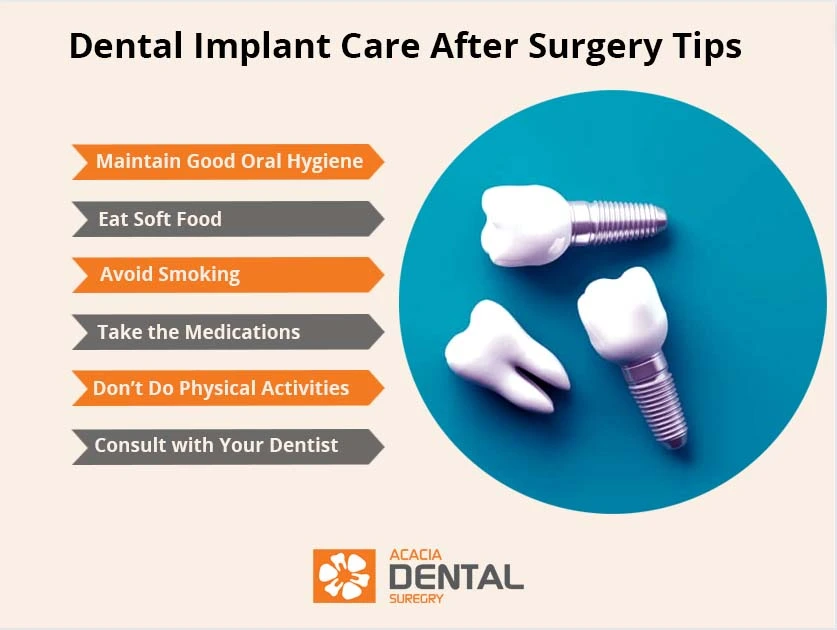In this article, we delve into the 7 tips to consider for dental implants aftercare to prevent complications and failure.
What Are the Reasons for Dental Implant Failure?
The dental implant is a major procedure that requires healthy gums and a strong jawbone. Additionally, the experience of the surgeon who is doing this procedure is important. But that’s not all! Like all other surgeries, dental implant care after surgery is another reason that can prevent implant failure. Here is a quick overview of common problems after dental implant that may cause failure:
- Infection
- Gum disease
- Insufficient bone support
- Nerve damage
- Tissue damage
- Sinus problem
- Bleeding,
- Allergic reactions.
Some of these problems are preventable by check-ups before surgery. As an example,
- An X-ray is required to ensure that the patient doesn’t have any dental problems or infections in the gums.
- The healthcare provider reviews the medical history of the patient to ensure there is no health issue such as diabetes. Because dental treatment for diabetic patients requires more tests and check-ups.
- CT (Computed Tomography) and CBCT (Cone Beam Computed Tomography) are other tests needed before the surgery to provide precise information about the health of the teeth, bones, and overall oral health of the patient.
Explore “Common Problems After Dental Implant” for a trouble-free smile.
What do the test results show?
All these tests are taken to ensure that the dental implant procedure won’t have any complications. The results can show if the patient needs a dental bone grafting procedure before the surgery, needs gum surgery, or takes medications to prevent infections.
Furthermore, the tests can help the surgeon predict the result of the treatment, and the placement of the implant. In some cases, they may help them choose implant material. For example, some patients may be allergic to metals like titanium implants, if they find this allergy before the surgery, the dentist will recommend another type of implant to prevent complications after surgery.
Discover Crucial Insights on Dental Bone Graft. Click now for essential knowledge about this dental procedure.
Dental Implant Care After Surgery Tips
Apart from all the tests that are taken before dental implants, it is essential for the patient to follow instructions after the surgery to prevent complications. It should be noted that the first two weeks are the initial healing period, which is critical for dental implant care and maintenance.
However, you should know that it may take up to 6 months for the implant to integrate into the bone. Therefore, you should still care. Here are some tips that you should follow as dental implant aftercare instructions.

1-Maintain Good Oral Hygiene
The first and most important thing to consider after a dental implant procedure is to maintain good oral hygiene to prevent infections. Maintaining oral health is crucial not only for protecting implants but also for ensuring the well-being of natural teeth and adjacent tissues. Furthermore, it guarantees that the implant maintains its natural appearance and does not develop an unsightly appearance due to gum disease or other oral issues.
Although you may not be able to brush or floss your teeth up to two days after the surgery, it is essential to follow a dental care routine, such as brushing your teeth twice a day or rinsing salt water.
2- Eat Soft Food
It is obvious that you may not be able to chew or bite for a couple of days after the surgery. Therefore, it’s crucial to eat soft and easily chewable foods to aid in the healing process. Furthermore, one important tip to consider as dental implant aftercare is to avoid eating spicy foods because they can irritate the surgical site. Here are some healthy foods you can eat after a dental implant procedure:
- Soup,
- Yogurt,
- Mashed Potatoes,
- Smoothies,
- Leafy Greens,
- Oatmeal.
Note: Hot drinks and foods are also prohibited after this procedure.
3- Avoid Smoking
One of the worst habits that can also lead to dental implant complications is smoking. It should be noted that smoking is associated with a higher risk of implant failure and infection. It can also impair the healing process and decrease blood flow, making it harder for the implant to integrate with the bone tissue.
4- Take the Prescribed Medications
It’s common to feel pain and irritation after dental implants. Your surgeon may prescribe painkillers and other medications to reduce the pain and inflammation after the surgery. It is recommended to take the medications as instructed.
Always follow your oral surgeon’s post-operative instructions, including dosages and frequency for any medications prescribed or recommended. Additionally, if you have any concerns or questions about your medications, consult with your oral surgeon for personalized guidance.
5- Keep in Touch with Your Dentist
Parts of dental implants aftercare are done by your dentist. Therefore, regular check-ups are crucial to monitor the healing process. Even after the initial healing phase, it is still recommended to go for dental check-ups at least twice a year to ensure the stability of the dental implant.
Note: If you usually wear partial or full dentures, orthodontic retainers, or any other related dental products, let your dentist know. You should not use them immediately after the surgery.
6- Don’t Do Physical Activities
If you are an athlete or you usually follow a routine workout, consult with your oral surgeon to understand when you can retake these activities. Since it may take several months for the implant to completely heal, your physical activity may lead to dental implant complications.
Bottom Line
proper dental implant aftercare is crucial for the success and longevity of this procedure. Patients should follow their dentist’s instructions carefully, including maintaining good oral hygiene, avoiding hard or sticky foods, and attending regular check-ups. With the right care, dental implants can provide a long-lasting and natural-looking solution for missing teeth.
